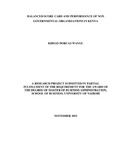Balanced Score Card and Performance of Non Governmental Organizations in Kenya
| dc.contributor.author | Wangu, Dorcas K | |
| dc.date.accessioned | 2016-04-20T11:57:37Z | |
| dc.date.available | 2016-04-20T11:57:37Z | |
| dc.date.issued | 2015 | |
| dc.identifier.uri | http://hdl.handle.net/11295/94393 | |
| dc.description.abstract | The balanced scorecard has enabled many organizations to overcome the deficiencies traditional performance measures that largely focused on financial performance of an organization. This system provides feedback on internal business processes and external outcomes to continually improve organizational performance and results. However application of the balanced scorecard in any organization needs to be given a strategic approach and the support of the top management and leadership matters in ensuring that the tool is successfully implemented. The purpose of this study was to investigate the application of the balanced score card and its effect on the performance of nongovernmental organizations in Kenya. The study had three specific objectives to be achieved: establish how the balanced scorecard is applied among NGOs in Kenya; establish the challenges faced by NGOs in Kenya in application of the BSC and determine the effect of the BSC on performance of NGOs in Kenya. The study took the form of a survey of NGOs. Data was collected using a questionnaire from 45 respondents who were the sample size. The data was analyzed using percentages and descriptive statistics such as the mean. The findings were presented in tables and figures. The study established that there are several determinants of application of the BSC by NGOs in Kenya. Key among these determinants include the type of leadership that is found in the organization; the internal structure of the organization; the pressure that stakeholders exert on the organization; the level of communication that exists among the stakeholders; the need for transparency and accountability; optimum utilization of resources and acceptance by employees. There are also six main challenges of application of the tool by NGOs in Kenya. They include lack of clear and realistic objectives; resistance to change; lack of clear cause effect relationships; having a formless strategy; unclear strategic themes and maps and lack of commitment from employees. The study further established that there is a strong positive correlation between application of the balanced scorecard and the performance of the NGOs in Kenya. The study recommends that it will be important for organizations to develop clear and realistic objectives that can facilitate application of the BSC and that top management in NGOs need to understand that they play a significant role in application of the tool. The study limitations include the fact that most of the Nongovernmental organizations operate as not for profit organizations hence it was not possible to view them from a business perspective as far as the application of the BSC is concerned and NGOs are largely dependent on donor funding and retention of employees for a very long time is therefore never guaranteed. It was therefore difficult to get information that would adequately satisfy some of the queries. The researcher suggests that a comparative study will be important to enable the NGOs benchmark for best practice. The major implications of the findings include formulation of policies that can enhance application of balanced scorecard and ensuring that this is observed among the NGOs since it is an important tool of performance. | en_US |
| dc.language.iso | en | en_US |
| dc.subject | performance of non governmental organizations | en_US |
| dc.title | Balanced Score Card and Performance of Non Governmental Organizations in Kenya | en_US |
| dc.type | Thesis | en_US |

